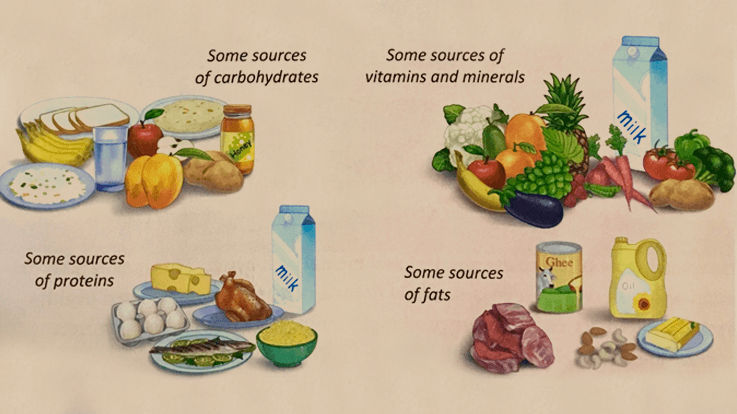What is a Balanced Diet for Children's Complete Growth?
.png&w=3840&q=75)
Health is a state of physical and mental well being which means that the body and mind must be completely fit for a person to be considered healthy. Proper diet, rest and exercise are essential for staying healthy.
What is a Balanced Diet?
Child's diet must include adequate amounts of different components of food i.e. Carbohydrates, Proteins, Fats, Micronutrients (vitamins and minerals), etc along with Fibre (roughage) and water which is required for the healthy functioning of our kid's body. All this together is called a balanced diet. [Must try - Generate Daily Meal Plan for your child]
Is your child overweight or underweight? Did you know that whatever the case be your child is under the risk of health hazard? How? You may ask. Well, as you as a mother must have guessed that if your child is overweight she is at risk of getting high blood pressure, heart disease, diabetes & many other health-related problems which can be fatal in the long run. Being underweight on the other hand is another health hazard, causing fatigue, predisposition to disease, infection, hair & skin problems. So how do you strike a balance and aim for an optimal weight for your child?
What Should Balanced Diet Contain for Toddler's Optimal Growth & Development?
Here, I have listed some essentials of a balanced diet, which when taken will help your child lose/gain weight accordingly and lead a healthy life. It is said that regardless of your child’s body weight, she needs to eat certain foods in specific proportions every day. The various foods can be divided into seven groups...
# 1. Milk & Milk Products -
The first group consists of milk & its products. A child needs to have a minimum of 4 servings of milk daily. Besides providing goo quality protein, milk also gives us calcium (for the bones & teeth) & vitamin B complex.
# 2. Fats & Oils -
The second group contains fats & oils (like butter, cream, vanaspati, ghee). The minimum daily fat/oil intake should be 3 teaspoons. This is chiefly the energy providing group.
# 3. Cereals -
The third group is cereals. These are valuable for protein, Iron, vitamin B complex & calories. They provide roughage that allows easy bowel movement & keeps the digestive system in order. Cereals include various types of bread, chapattis, idlis, dosa, macaroni, noodles, rice, etc. any of these should be taken in all the three major meals. Just Look at a balanced diet chart for your child's complete growth & development. [Explore: How to Make Child's Meal Plan Interesting?]

# 4. Proteins -
The fourth group is proteins (body-building) it contains lean meat, fish, and chicken for non-vegetarians & nuts, dals & beans for vegetarians. One to two servings from this group is a must in your child’s daily routine.
# 5. Essential Vitamins -
The fifth group provides essential vitamins like vitamin A (for eyes) & iron (blood formation). This includes all the green leafy vegetables & other vegetables like spinach, fenugreek (methi), collards, iceberg lettuce, romaine lettuce, kale, sweet potato, pumpkin, carrot, broccoli, tomatoes, red bell peppers, etc. Besides maintaining the health of eyes & the skin, these vegetables have roughage enough for regular elimination (bowel) habits. 1 or more servings of this group are essential in our daily routine.
6. Vegetables & Fruits -
The sixth group contains all the remaining vegetables & fruits. These vegetables & fruits include apple, strawberries, kiwi, avocado, pineapple, beetroot, papaya, yellow peppers, etc. One or more servings of this group are also essential for your child’s healthy growth. This group is a provider of all the vitamins & minerals that are essential for the normal functioning of the body system.
7. Vitamin C -
The last group is an important group of citrus fruits since it is rich in vitamin C. Vitamin C is necessary for the health of the gums & blood vessels. It also protects your child from contracting any kind of infections, especially cold & coughs. Vitamin C sources are all citrus fruits like oranges, & lemons, tomatoes, amla, grape fruit, brussels sprouts, black currants, melons & cauliflower. Even green chilies & capsicum are rich in vitamin C. One serving should be included in daily routine.
NOTE: Sugar is not mentioned in the seven groups since it provides only empty calories & does not come under the category of the essential food items. A balanced diet should comprise of all the above-mentioned food groups and that’s why a serving of every group is necessary for your child’s daily routine to maintain a balance among all the nutrients. So keeping the various food groups in mind, it becomes simple to have a balanced diet.
Please do share your feedback and valuable comments with us in the comments section below
Be the first to support
Be the first to share
Comment (0)
Related Blogs & Vlogs
No related events found.
Loading more...